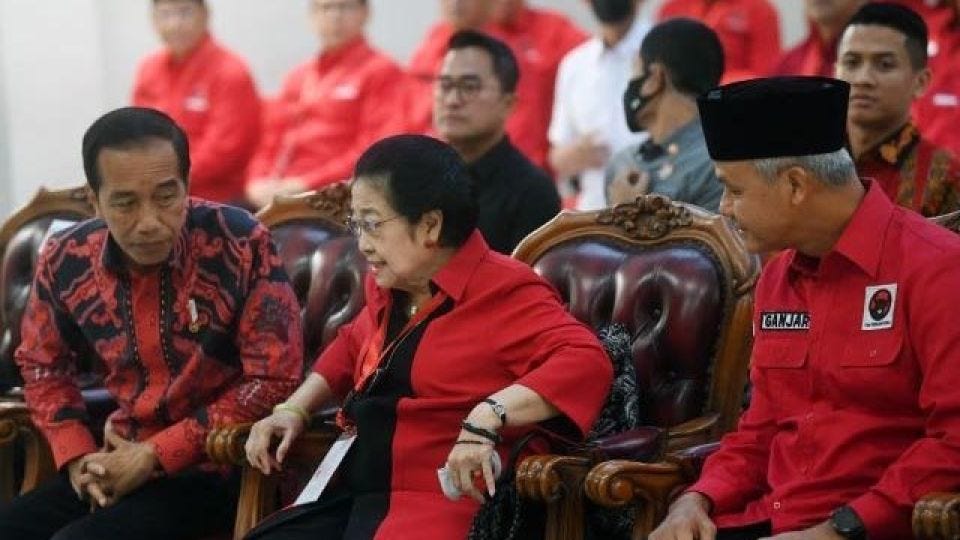Way Open for Jokowi's Son in Indonesia’s Vice-Presidential Race
Constitutional Court drops age limit
By: Ainur Rohmah
An unexpected decision by Indonesia’s Constitutional Court allowing presidential and vice presidential candidates under age 40 appears to be a clear signal that President Joko Widodo's oldest son, Gibran Rakabuming Raka, will be somebody’s running mate in next year’s general election sweepstakes, putting the popular president firmly on the road to building a family dynasty. Gibran, the mayor of Solo, is 36.
Defense Minister Prabowo Subianto may have won the hearts of the president’s supporters as his policy heir since Prabowo joined the government as Minister of Defense in 2019. But the relationship between Jokowi and his party, the Indonesian Democratic Party of Struggle (PDIP), is unclear following Jokowi's stance over party choice Ganjar Pranowo, the popular Central Java governor. Abandoning the PDIP, the country’s biggest and most powerful party, and its doyen, Megawati Sukarnoputri, to back Prabowo – who ran against Jokowi in two bitter presidential races earlier – has its perils.
In the decision, by a panel of judges headed by Anwar Usman – Jokowi's brother-in-law – the Constitutional Court reduced the age of candidates but only for those with experience as elected officials, which appears tailored for Gibran, the Solo mayor since 2021. The court issued the decision on October 16 in response to a lawsuit against the article concerning General Elections filed by a university student, Almas Tsaqibbirru. The decision wasn’t without controversy, attracting attention in various cities, from both supporters and opponents. Most of the demonstrations ended peacefully, but action in Makassar ended in chaos.
"That by referring to data on the number of elected regional heads under 40 years old in the previous election (2019), accompanied by the performance of regional heads under 40 years old and the good performance of young ministers, the constitution should not limit constitutional rights of our young people can nominate themselves as presidential and vice presidential candidates using the age limit requirement," said the attorney.
Before entering politics, Gibran was an entrepreneur, managing an F&B and Event Organizer business he founded after graduating from the University of Technology Research in Sidney, Australia. The PDIP anointed him as Solo mayor for 2021-2025, the city of his father’s maiden entry into politics. Recently Gibran’s youngest brother, Kaesang Pangarep, joined the Indonesian Solidarity Party (PSI) and was immediately named general chairman. Jokowi's son-in-law, Bobby Nasution, currently serves Medan mayor, is reportedly on the list for several parties to run as Governor of North Sumatra.
Constitutional law expert Feri Amsari criticized the court's decision as a "red carpet" for Gibran. Analysts argue that the decision will not only have an impact on presidential election regulations, but also tarnish the already doubtful performance of the court and is an indication of the strong political interests behind election regulations, which change every five years.
Chico Hakim, a member of the National Winning Team for Ganjar Pranowo, Ganjar’s campaign vehicle, said the court has overstepped its authority by adding new material relating to experience as regional heads rather than merely interpreting law.
The General Election Commission (KPU) has scheduled the general election for February 14, 2024, with registration later this week. With the approaching registration period, politics are heating up, generating reports of a breakdown in relations between Jokowi and the PDIP, with many assuming Jokowi will rebel against the party’s choice of Ganjar Pranowo as its presidential candidate. That could be signaled by Kaesang's move to join PSI - which has moved closer to Prabowo than to PDIP. Jokowi's volunteer group Projo recently also declared support for Prabowo.
Ujang Komarudin, a political observer from Al Azhar University, said these signals strengthen indications of Jokowi's strained relationship with Megawati. The president has rebelled frequently, including when PDIP rejected the idea of extending the presidential term to three times, denying him another stint in office, and refused the Israeli football team’s participation in the U-20 World Cup, wrecking Indonesia’s bid to host the event.
Jokowi’s kingmaking ambitions are thwarted by Megawati, the general chair of Indonesia’s largest and oldest party, controlled for decades by the family of Indonesia’s modern founder and Megawati’s father Sukarno. Jokowi's support for Prabowo, said Ujang, is aimed at securing his political future after leaving office. The departing president also feels the need to ensure that his legacy is protected in the construction of the new capital city Nusantara, mineral downstreaming, and other strategic government projects. As the country’s most popular public official – with an approval record nudging 80 percent – the president has many political levers to pull. Moreover, he has said he would intervene in the 2024 presidential elections.
PDIP House of Representatives member Ahmad Basarah said that while his party is wondering about the true direction of Jokowi's support, he believes he won’t leave the PDIP. "I can't imagine that the party (Gerindra) that once beat him, insulted him, slandered him, he will embrace. How is it possible that the party that gave birth, raised and looked after him for almost 10 years of his reign will be beaten, will be abandoned, and hurt?" Basarah was quoted in local media detik.com.
If the rumors that Gibran will accompany Prabowo come true, many argue that PDIP will double its efforts to defeat him — and Jokowi — in the general election. While the votes of Jokowi's supporters in the PDIP could shift to Prabowo, the number isn’t expected to be significant. PDIP is big enough to now need only one party in its parliamentary coalition, the United Development Party (PPP), and several small parties outside parliament. Prabowo’s much smaller Gerindra is supported by a large coalition of smaller parliamentary entities and several small parties.
Another presidential candidate, former Jakarta Governor Anies Baswedan, running a distant third, is now supported by three parties in parliament, including the National Democratic Party (Nasdem), whose two members who served as ministers are currently being prosecuted for their involvement in a corruption case.



